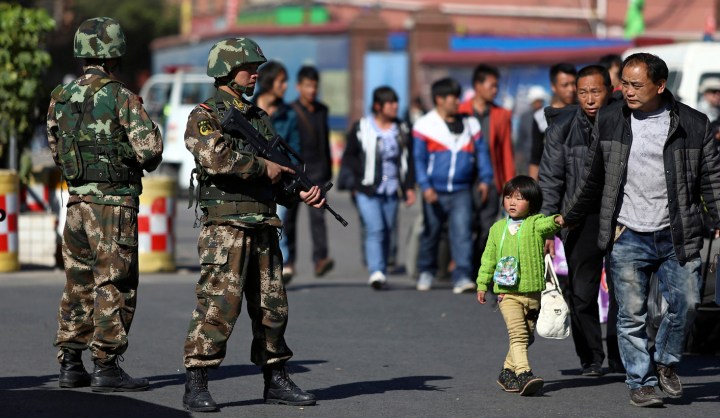World
China’s Kunming attack: When the cracks are exposed

After the brutal knife massacre in a Chinese train station on Saturday, Chinese authorities have promised to go after the “terrorists” with everything they’ve got. But it’s not the terrorists they’re really worried about: the real concern is the great crack in the foundation of China’s economic and social development that the attack has revealed. By SIMON ALLISON.
It really doesn’t take much to upset the delicate harmony in which modern China exists. In such a tightly-controlled environment, taking just a few steps out of line is a challenge to authority; civil disobedience is a rebellion.
In this context, last week’s massacre in Kunming was not just an act of terrorism. For China’s leaders, gathered in Beijing for the annual National Congress of the People, the violent attack represented something far more significant: a blow to the very foundations of the Communist state itself.
Here’s what happened, in case you missed it (and you may well have. The attack, despite its severity, received relatively little international media coverage, compared to, say, the Boston bombings): on Saturday, at least eight identically-dressed attackers, both men and women, stormed into the train station of the south-western city of Kunming, a favourite destination for domestic tourists.
“The Communist Party must control the guns,” said Mao, famously, but these attackers did not carry guns. They had swords, and knives, with which they were able to inflict just as much damage. In a frenzy of slashing and stabbing, 29 civilians were killed, and another 140 people injured. It took the security forces ten minutes to reach the station; when they did, the situation was rapidly contained, with one police officer singlehandedly responsible for shooting dead four swordsmen, and injuring one swordswoman, in the space of 15 seconds. The officer – a Chinese version of Chuck Norris – is now a national hero. Three attackers escaped, but not for long. By Wednesday, they were rounded up and are now in police custody.
It didn’t take long for speculation to begin about the identity of the attackers, and what their motives were. Suspicion fell instantly on Uighur separatists from the remote western province of Xinjiang (literally “New Frontier”), and that’s where it has settled. Kunming authorities have said that evidence from the scene supports this theory. In particular, officials have released images of a black flag with a crescent moon – proof, they say, that Muslims were involved. And if its Chinese Muslim terrorists you’re looking for, then chances are that one or another of the Uighur separatist groups are involved. Over the past few years, these have provided the most consistent and violent opposition to the Beijing government – most recently, Uighur militants were blamed for the exploding 4×4 vehicle which killed two bystanders in Tiananmen Square in October.
Xinjiang is a problem for Beijing. The province is remote and poor, and its Uighur population has historically been independent. It is an independence that some want back, especially as little has been done in recent years to help the Uighurs out of poverty. Worse, the province has enjoyed spectacular economic growth, but much of this has gone to its ethnic Han Chinese residents, whose numbers are constantly being bolstered by an aggressive policy of settling people from southern China to Xinjiang. In Xinjiang, there is plenty of fuel for dissent – and plenty of people brave enough to light those fires.
But Xinjiang’s not the biggest problem here. China can handle dissent, and its security forces have clamped down viciously on not just the separatists but on the Uighur population as a whole. The security forces have also tightened security on key locations, which probably explains why the relatively insignificant and lightly policed Kunming was chosen as the latest target.
Of greater concern is the impact that this perceived ethnic division will have on China’s grand nation-building project. Over the last few decades, China has made a virtue out of stability. One of the key drivers of this stability has been an absence of internal conflict. The idea is that tribe, ethnicity and religion (where it is allowed) are secondary identities, which are trumped always by unwavering commitment to the ideology espoused by the Communist party. Communist first, Uighur second, in other words.
But ideology is an ephemeral concept, and it is only effective as long as it is working. When it stops working, more subversive identities begin to assert themselves, as the New Yorker’s Evan Osnos explains:
“In China today, the ties between ethnic groups are rooted not in Communism but, for lack of a better word, in ‘GDP-ism’—faith in economic growth and the push for prosperity. But that is a fragile bargain. Militant Uighurs are motivated largely by resentment of their relationship to Han Chinese. Xinjiang’s Uighur population has dropped from ninety-five per cent, in the early twentieth century, to forty per cent in 2008, thanks to an explicit migration policy intended to bind the country more tightly. On the ground, the development policy has created vast new infrastructure and economic activity, but, crucially, it has also accentuated the socioeconomic gaps between Hans and Uighurs. In Xinjiang today, Hans hold more than thirty five per cent of the region’s the high-income jobs, while Uighurs hold thirteen per cent. The ratio is widening by the year, fuelled by, and creating, even more resentment and suspicion. The events [in Kunming] will make that worse.”
Nervous not only of further Uighur unrest, but also of a potential backlash against Uighurs, the authorities have been at pains to distinguish between Uighurs in general and the Kunming attackers in particular. “Don’t turn your anger for the terrorists into hostility toward an ethnic group,” exhorted the state-run People’s Daily. “This is exactly what they want!”
At the same time, China has desperately trying to place the attacks in the wider context of the Global War on Terror – anything to deflect attention from the criticism of the government, and therefore the party, inherent in the actions of the attackers. In this, China has had little support. In particular, the USA – usually the first to see terrorists under the bed – had to be cajoled into acknowledging that the Kunming attack “appears to be an act of terrorism”.
“Terrorism does not have national boundaries. We wish and expect that our efforts to crack down on terrorism will gain international understanding and support in the future,” complained a Chinese government spokesperson.
China’s recent, stratospheric economic growth and accompanying social development has been underpinned by an unprecedented period of national stability. This is partly a function of an authoritarian, repressive government, sure; but it’s also been thanks to skillful accommodation of China’s diverse population, and popular buy-in to the Communist Party’s vision. With the economy slowing, China quite literally can’t afford serious social unrest. As far as the leadership is concerned, everyone needs to just get along. DM
Photo: A girl looks up at patrolling paramilitary policemen with guns after a knife attack along a street near Kunming railway station, Yunnan province, March 2, 2014. China blamed militants from the restive far western region of Xinjiang on Sunday for an attack at a train station on the other side of the country by knife-wielding “terrorists” in which at least 33 died, including four of the assailants, who were shot dead. REUTERS/Wong Campion

















 Become an Insider
Become an Insider